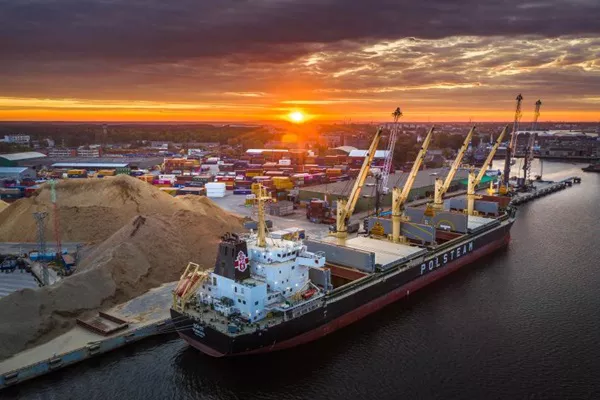The Freeport of Riga Board has approved an investment plan for the Port of Riga in 2025, allocating EUR 7.43 million for development. This marks a 17% increase compared to last year, with an additional EUR 1.07 million. The investment will focus on continuing major infrastructure projects and launching new initiatives crucial to the port’s growth.
Sandis Šteins, Chairman of the Freeport of Riga Board, emphasized that this year’s investment priorities include large-scale infrastructure development and digitization projects. These upgrades are aimed at boosting the port’s ability to attract new investments, particularly for modern manufacturing and logistics parks. Šteins noted that although there is strong investor interest, the current infrastructure sometimes does not meet the needs of large-scale projects, making targeted investments essential.
Key projects for 2025 include the completion of the traffic overpass from Tvaika Street to Kundziņsala. The Freeport of Riga Authority will focus on building port and public infrastructure in the area, including a modern port pass checkpoint with a digitized access system for road transport and cargo management. The overpass project, led by the Riga City Municipality, is expected to be completed by early 2026.
The development of industrial infrastructure in Kundziņsala will also continue, transforming the area into a major cargo warehousing and logistics hub. The port is preparing for significant international investments, including wind technology manufacturing projects. A €64.6 million investment into this area was approved by the Cabinet of Ministers in 2024, with a total project cost of over €85 million. This includes the construction of access roads, a new deep-water berth, and dredging. The project is set to be completed by 2029, with offshore wind turbine component manufacturers expected to establish large-scale facilities.
In partnership with the Riga City Municipality, the Freeport of Riga will begin reconstructing Flotes Street in 2025. The project will improve traffic infrastructure, including pedestrian, cycling, and vehicle lanes, as well as stormwater management and lighting. Work is scheduled to begin at the end of 2025, with completion expected by 2027.
Further development of passenger transport infrastructure will continue, with the Freeport of Riga Authority planning improvements to navigation infrastructure in Eksportosta. This includes dismantling part of the ED Dam to allow large cruise ships to dock near the historic city center. This work is expected to be completed by summer 2026.
Digital transformation remains a key focus, with plans to equip port checkpoints with biometric and machine vision solutions to enable contactless control of people and vehicles. The port is also working on a digital platform to streamline communication and data exchange among port users, cargo carriers, and authorities.
As part of its commitment to the EU Green Deal and climate goals, the Port of Riga will continue its participation in the “BalticSeaH2” project, which explores hydrogen technology in maritime transport. A feasibility study will also be developed to assess the conversion of the port’s fleet to hydrogen-based hybrid propulsion.
In 2024, the Freeport of Riga successfully completed several significant projects, including the military mobility project, which invested EUR 12.51 million to enhance the port’s competitiveness and security. Construction of an industrial park for renewable energy is also underway, alongside a contract for the development of a 100 MW solar park.
The total budget for infrastructure projects in 2025 is EUR 7.43 million, with EUR 5.43 million from the Freeport of Riga Authority and EUR 2 million in co-funding from the EU’s Recovery and Resilience Mechanism Programme for digital transformation efforts.
Related Topics:


